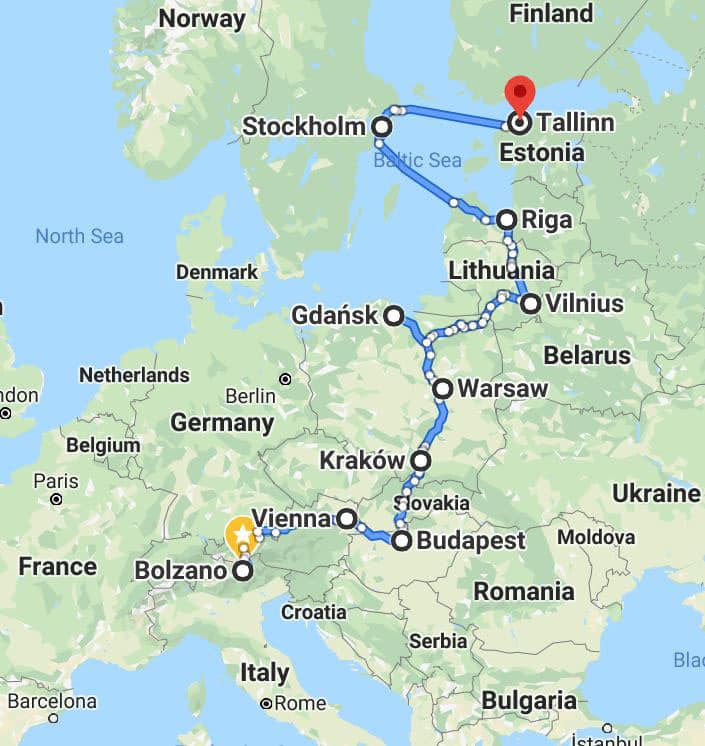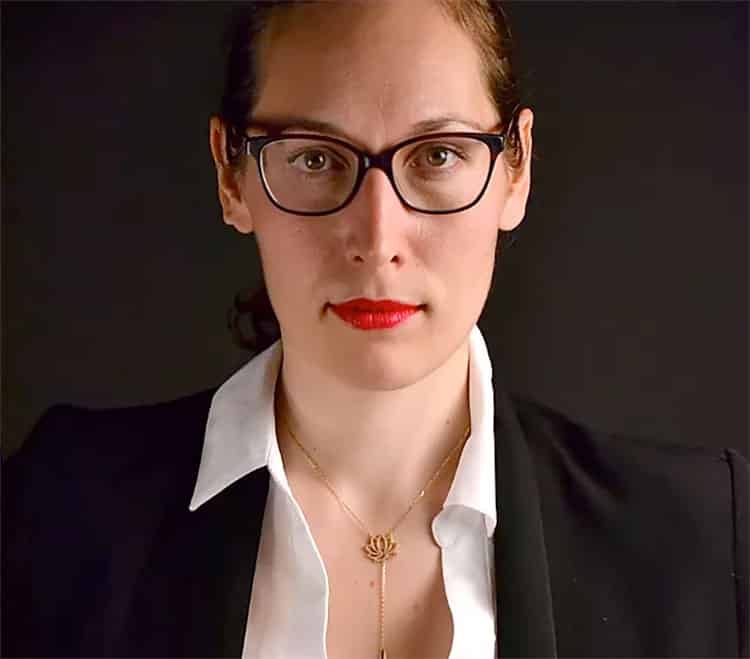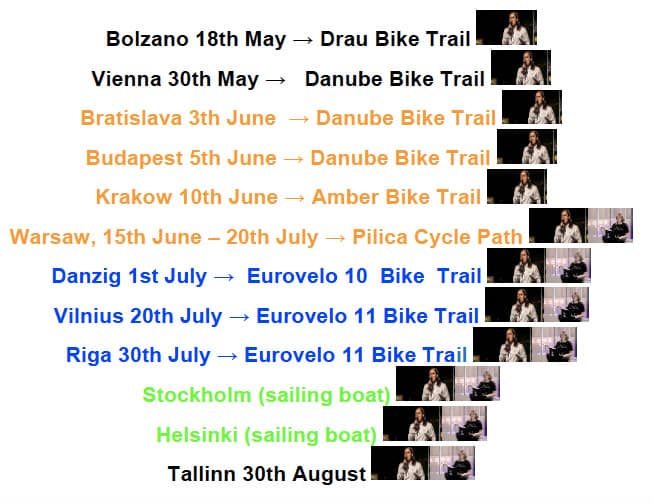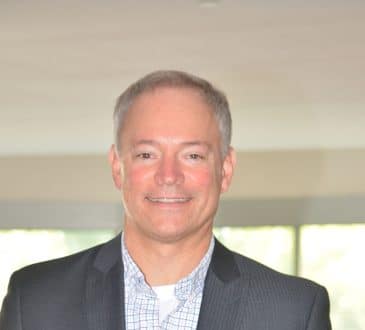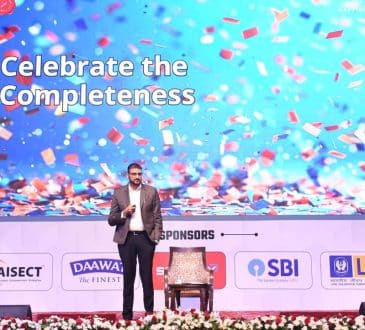Mahina Journey: 3000km through the European Union
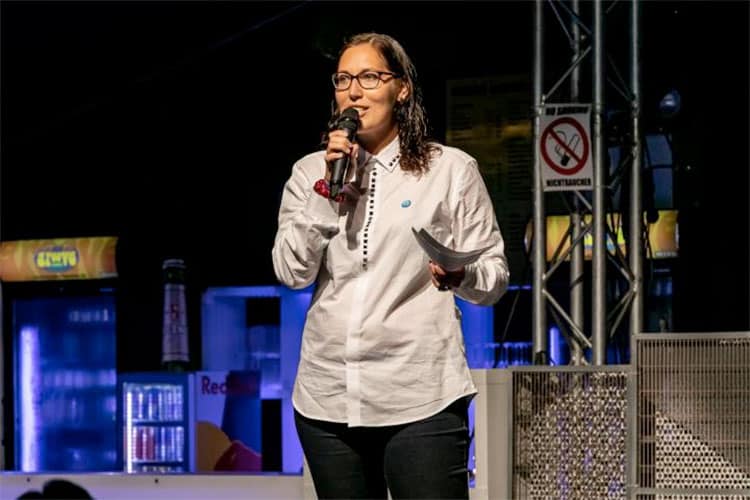
A journalistic journey with the biker nomads Carolin Desirée Töpfer and Valerie Lux.
- Departure: 18 May 2020 in Bolzano, Italy
- Planned arrival: August 2020 in Tallinn, Estonia
Summary: What do we do? We make a transparent research trip. Our guiding journalistic question is: Where is the money after the coronavirus pandemic? We are looking for the holy grail: business models of companies that have stably survived the pandemic.
Who are we?
Two young female journalists and entrepreneurs who want to change the world.
How we work
Biking Nomads: We are extreme digital nomads – we don’t have a permanent home, but work from on the road with a solar battery in our tent or mobile internet on the river bed, in CoWorking Spaces or in cafés with WLAN. We travel with our e-bikes from place to place of our digital reporting.
Green Work: We ride the e-bike because we want to show that digital technology and the stay in the green nature are a harmonious combination. We practice the working form “Green Work” and are active supporters of Greta Thunberg.
Tech Girls: We only work with the latest technological equipment. From bicycle helmet cameras to neuroenhancement and GPS transmitters, we burn for digital gadgets and journalistic tech equipment that allows multi-perspective reporting.
Valerie Lux, 29 years old, is an investigative journalist and feminist business consultant. The award-winning journalist and digital nomad since 2018, is the founder of the management consultancy “Einhornconsulting” for social entrepreneurship. She has been traveling Italy for two years without a permanent residence, but with a laptop. She started the Mahina-Journey on 18 May 2020 in Bolzano.
Carolin Desirée Toepfer, 31 years old, entrepreneur and cybersecurity expert, is the managing director of “cdt digital” for three years and renowned author of the blog “digitalisierung-jetzt.de”, which was nominated for the Grimme Prize. After having founded three companies, she is familiar with investment and financial management. Since 2016 digital nomad and speaker have been traveling from stage to company. She will start the Mahina-Journey in Berlin on 10 June 2020.
Our working guidelines
- Financial Transparency: We stand for absolute financial transparency. We are entrepreneurs out of economic lifeblood. We believe that transparent cash flows are a prerequisite for a healthy social market economy. That’s why we report on our own account balance as well as on grants to industrial sectors or the self-employed, and we are committed to borrowing from the state budget.
- Self-sufficient: Our journey is under the sign of self-sufficiency. Those who are self-sufficient survive. Self-sufficiency means being independent of the movement of people and goods. Self-sufficiency means being independent of state subsidies. On Mahina-Journey we use a lifestyle that is as self-sufficient as possible: we cycle and, as far as possible, do without cars and other CO²-heavy means of transport.
- Working in Cycles: Successful entrepreneurs have proven that working in cycles (rather than in a linear 5-day week) leads to greater efficiency and productivity and thus to more profitable business models. During our journey, we will work according to the Moon Scrum, a project management system for companies during the Corona crisis, which we designed. It is based on the stable rhythms of the lunar cycle and is equally suitable for male and female managers, taking into account the menstrual cycle.
The journalistic path of our journey
We don’t take a vacation, we do hard journalistic work. We produce our journalistic products consistently trimedial in video, audio and writing. We work together with two external video editors to report in the character of live reports. We report for three months (June 1 – August 30, 2020).
We produce per month:
- 2 – 4 videos (5, 10, 20 and 40 minutes)
- 2 – 4 articles with photos (3000 – 10,000 characters)
- 2 – 4 audio contributions (5, 10, 20 and 40 minutes)
Our articles are available in two languages: German and English. We speak both languages fluently. We work together with paid professional translators for subtitles and correctors so you get only excellent quality. A monthly subscription to our trip costs 2500 Euro, including VAT, to be obtained at https://www.patreon.com/valerielux
We report for you
We provide videos in YouTube quality (4k resolution, 20mpx), audio contributions in public radio quality and articles in fascinating storytelling.
Individual arrangements for correspondent interviews or a focus on a specific sub-reporting along our four topics are possible. If you have certain technical pre-conditions or fixed time intervals for your media channel we are happy to adapt our reporting to your needs.
Social Media: We communicate consistently and regularly via social media with our followers on our journey. We ensure that our media partners are appropriately mentioned and linked regularly. To do this, we use the LinkedIn and Instagram networks with the highest priority, as our interaction rate is the highest here. We also share our contributions via Facebook and Twitter.
1. LinkedIn (Valerie Lux / Carolin Desirée Toepfer)
2. Instagram (@valerie_lux_ / @justme_cdt)
3. Facebook (Valerie Lux / Carolin Desirée Toepfer)
4. Twitter (@valerie_lux / @digi_strategin)
You can already find work samples of our trip under the Instagram account of Valerie Lux.
The values of our journalistic reporting
Investigative journalism: We report independent of the cash flow of political parties and private companies. We back up our research waterproof with facts. We ask for the moneytrails after the Corona crisis until it hurts. This means: We question our own financial responsibility as well as of the other actors based on our own and on their biography.
European journalism after US professor John Rawls: We are convinced that business journalism must serve to help minorities and reduce privileges. For this reason, we are guided by the principle of fairness of the economic philosopher John Rawls, which states that social and economic inequalities are to be shaped in such a way that they can reasonably be expected to serve everyone’s benefit and are associated with positions and offices that should be open to everyone. That is why our reporting particularly includes the perspectives of youth, migrants and women, the latter accounting after Eurostat for only 17% of senior management positions in the European Union. Young people and children are generally regarded as the losers of the corona crisis, and that is why we pay particular attention to Europe’s youth in our reporting.
Solution-oriented MoJo journalism: We write constructively about the solutions to economic and social problems, instead of just naming shortcomings. This is referred also as „constructive journalism“. As reporters of a new generation, we work consistently digitally and are committed to so-called mobile journalism (MoJo).
Data Journalism: We have the know-how and the ability to structure huge amounts of data using the analysis of artificial intelligence. In this way, we find connections that often remain hidden from the mere subjective view of a journalist. Data-based journalism offers us a factual basis.
Journalists for Transparency – J4T: We base our reporting on the principles of Transparency International. Our working methods are open and honest. We are reliable in our working relationships and condemn bribery and corruption wherever we find it. We are committed to timely and accurate reporting to our media partners.
Product Cooperations: We do honest product testing of technical applications in relation to e-mobility, digital applications and mobile nomadism
Topics
Journey‘s key question: WHERE IS THE MONEY AFTER COVID-19?
ECONOMY
Economic corruption or fair state aid?
In many EU countries, a major debate on distributive justice was conducted during the Corona crisis. We examine the question of which companies were “systemically relevant enough” to be saved by state aid and which industries were affected by the largest wave of insolvencies in comparison to the US. We like to compare the similarities and differences according to which different EU national states prioritized their state aid.
POLICY
Political corruption or legitimate emergency measures?
To what extent has Corona corrupted the political process? In Poland, the national parliamentary elections have been postponed, in Hungary, emergency laws have been put into effect by the government in a coup d’état, with false testimony punishable by up to five years in prison. We want to investigate which laws are still in force after the Corona crisis and how the legislation of nation-states has changed permanently, thus denying political advancement to fewer beneficiaries and poorer people.
DIGITALIZATION
Digital systems versus traditional bureaucracy
The Baltic states Latvia, Lithuania and Estonia have had a lower Covid-19 infection curve than the Western states. We want to investigate how these “digital tiger states” have reacted to the crisis. Our focus is especially on the “digital superstate” Estonia, where citizens were able to report their Corona sick leave online in the national health register within days – a register that many EU states do not even have yet. State-imposed agility and a national market model that is consistently geared towards digital technologies may have done more to save lives in the crisis situation than the policies of continental states whose market economies are dominated by catholicism or liberal constitutional models like the US. Based on the analysis of these states, we like to describe how crisis situations can be better mastered in the future with little effort but the highest digital efficiency.
A new era: The resilience of digital companies
We like to find out which companies with consistent digital business models in Latvia, Lithuania and Sweden have survived the crisis particularly well and which common prerequisites they share in terms of management style or internal organizational processes.
Cybersecurity
We examine the relationship between Russia, the European Union and the US regarding recent measures of counterintelligence during Covid-19. This topic is part of the price grant which was awarded for Valerie Lux as „Young German Journalist for Economy of the Year 2018“ by „Friedrich and Isabell Vogel Foundation“.
SOCIAL ENTREPRENEURSHIP
The definition of social entrepreneurship is to help alleviate major societal problems through private entrepreneurship. Nobel Peace Prize winner Mohammed Yunus is a social entrepreneur, his Graham Green Bank helps citizens out of poverty by successfully providing microcredits to women for decades. On our journey, we will pay special attention to companies that operate profitably according to these principles and set an example for other founders. We report on companies in the EU trade register that have created profitable balance sheets with social visions and profitable business models, that have survived the crisis and are role models for other founders.
Destination of the journey
Mahina Diverse Tech Accelerator
We use the trip to draw attention to the extreme discrimination against female start-ups. In the European Union almost 93% of all investors and business angels are male. Statistically significant studies show that founders without white skin colour and women perform significantly worse in the investment rounds than venture capitalists and therefore have fewer chances to bring their business models to the market.
In order to eliminate this discrimination of capital transfer, we are collecting start-up capital through our reporting on our trip to establish the Mahina Diverse Tech Accelerator in Tallinn, formed by the principles of Social Entrepreneurship. An Accelerator supports start-ups in their early founding phase with potential investors, mentoring, and start-up financing. Our call for founders around the world to apply, from the US to Bangladesh. In the first round, we call on social entrepreneurs in the technology sector to apply for a nine-month boot camp. Our call is open for founders around the world, from the US to Bangladesh.
Who is Mahina?
The name “Mahina” refers to a Hawaiian goddess of the moon who stands for female strength and conviction. Mahina stands as a caring mother for the creation of all-natural growth. Qualities which are the central prerequisite for a profitable managed company. The embracing of your own sexuality is the key to profitable business leadership. More on this in our journalistic pieces from the journey.
Provisional Roadmap
Written by Valerie Lux. Here’s what you’ve missed?
Most Startup Friendly Countries.
World’s Best Countries To Retire
Best Countries For Adventure Tourism.
Countries With The Best Quality of Life.
Bring the best of the CEOWORLD magazine's global journalism to audiences in the United States and around the world. - Add CEOWORLD magazine to your Google News feed.
Follow CEOWORLD magazine headlines on: Google News, LinkedIn, Twitter, and Facebook.
Copyright 2025 The CEOWORLD magazine. All rights reserved. This material (and any extract from it) must not be copied, redistributed or placed on any website, without CEOWORLD magazine' prior written consent. For media queries, please contact: info@ceoworld.biz



